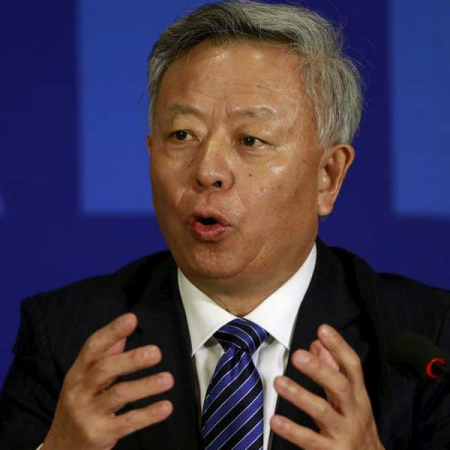
Asian Infrastructure Investment Bank President Jin Liqun.
One year after opening with 57 charter members, the China-led Asian Infrastructure Investment Bank would still welcome the U.S. to join its ranks, the bank's president Jin Liqun has said.
"The door will remain open," Jin said in a television interview, when asked whether he expected the U.S. to reconsider becoming a member.
He said: "We maintain a consistent policy. The AIIB is a multilateral development institution."
Approximately 30 economies are waiting to join, Jin said at the bank's headquarters in Beijing. The lender, with $100 billion of pledged capital-part of China's push to expand the nation's economic benefits to others, backed nine projects in seven countries last year.
Before it opened in January 2016, U.S. President Barack Obama rejected joining, only to see several of its closest allies sign up. Now Beijing is preparing for the incoming U.S. administration of Donald Trump, who's already straining ties before taking office on Jan 20.
Jin, a former deputy finance minister who also has worked at the World Bank and the Asian Development Bank on China's behalf, is still optimistic despite recent tensions.
He said: "We can work very well together."
He added that senior officials in the U.S. government, including both Democrats and Republicans, have shared with him their praise for the new institution.
He said: "I'm encouraged by the very positive comments on the AIIB."
The AIIB got a boost last year when the UK, Germany, France and Italy became members. Other U.S. allies such as Australia, South Korea and Canada also joined, leaving the U.S. and Japan as the only nations to hold off joining.
The AIIB's inaugural projects ranged from a slum upgrading project in Indonesia to a new pipeline linking gas fields in Azerbaijan to markets in southern Europe, via Turkey.
The bank lent $1.73 billion in 2016, exceeding an earlier target of $1.2 billion. Jin said 75 percent of the bank's projects so far are proposed and co-financed with existing lenders, including the Washington-based World Bank, Manila-based ADB and London-based European Bank for Reconstruction and Development, while AIIB staff selected the remainder.
The AIIB will continue to collaborate closely with those other multilateral lenders while beefing up its own capability and working to increase its disbursements, according to Jin.
"The pipeline is getting bigger," and the bank's priority is to "have a better balance across the regions, countries and sectors," he said.
Jin, one of the first postgraduate students to study English literature after China's cultural revolution (1966-76), is fluent in English and French and translated The House of Morgan, a book on the JP Morgan empire by U.S. author Ron Chernow, into Chinese in 1996. He also served as supervisory chairman of the country's sovereign wealth fund.
Now, he said, he's confident the country's economy will fare well during its transition to new drivers of growth.
He said: "China is faced with a number of challenges, particularly restructuring the economy, moving from excessive dependence on external sectors to domestic consumption, and improving the efficiency of the Chinese economy, not aiming at simply the numbers of the growth."
Factories and services activities capped a year of strengthening across several indicators. But under the hood, risks remain: Increasing pressure on the yuan, rising capital outflows and concern Trump may make good on threats of punitive measures against China's exports.
Foreign reserves fell for a sixth month in December, bringing the 2016 drop to $320 billion. The government has recently announced new measures, including extra requirements for citizens converting yuan into foreign currencies.
Jin said: "Some measure to address this issue in my view probably is necessary. I hope things would stabilize very soon, and panicking on part of investors would disappear." He said the global economic outlook this year is more positive than last year.
"If you look at the short-term cyclical recovery, and long-term trend, these two factors seem to be doing pretty well," Jin said.
"That would in my view favor infrastructure investment both in emerging market economies and in developed countries, which in turn will help sustain growth. It is gratifying to learn that even in the U.S., they would like to spend more money on infrastructure."


















































